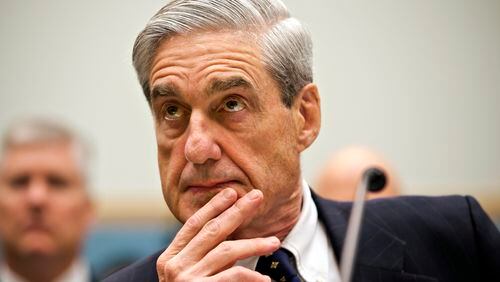“The single greatest Witch Hunt in American history continues,” Donald Trump tweeted this week. “There was no collusion, everybody including the Dems knows there was no collusion, & yet on and on it goes. Russia & the world is laughing at the stupidity they are witnessing. Republicans should finally take control!”
His message to his fellow Republicans is pretty clear: Make the investigation stop, and make it stop now. And it’s hardly the first time he has made that demand.
“Make it stop” was the message that Trump gave to then-FBI Director James Comey, when he pressured Comey to drop his investigation into National Security Adviser Mike Flynn. Trump then reiterated that demand when he fired Comey, making it clear to Russian officials in the Oval Office and in a media interview that he took that action in hopes it would end the investigation.
In short, Trump’s message is a demand that his fellow Republicans obstruct the execution of justice. And to a startling degree, a lot of those Republicans have been willing if not eager to try to do exactly that.
Congressional investigations into Russian interference in our 2016 elections have pretty much shut down. More alarmingly, Republicans in Congress are joining Trump and conservative media outlets in brutal attacks on the integrity of the FBI and the U.S. intelligence community, which are conducting the investigation.
If you believe their rhetoric, career professionals in those traditionally conservative law-enforcement and intelligence agencies — agencies led by people whom Trump appointed and whom a Republican Senate confirmed — have somehow become “corrupt” hotbeds of liberal activists who are intent on destroying the Trump presidency.
“We found out recently, there were people in the FBI plotting to bring the president down,” as U.S. Sen. Rand Paul alleged Thursday. “When you’re talking on an FBI phone, and you’re at work, and you’re conspiring with other workers to bring the president down, that is a real problem.”
That’s a claim so extraordinary, and so grave in its implications, that it should never be made cavalierly, without a lot of evidence to substantiate it. Yet there is zero evidence to substantiate it.
This kind of behavior is not totally unfamiliar. Cries of law-enforcement corruption and conspiracy are common in criminal cases in which the defendants know that they’re in danger and want to distract attention from the case itself. If you can’t attack the facts, you attack the people who uncovered the facts.
And while the fact that Trump and his aides are embracing that tactic doesn’t make them guilty, it does raise suspicion. So does the fact that as this investigation has deepened, the narrative out of the Trump camp has changed significantly.
They initially claimed, loudly and emphatically, that they had had no contacts or meetings with Russians. As of this week, more than 50 such communications have been documented, and two Trump aides have pleaded guilty to felony charges of lying about those contacts. As prosecutors like to say, the truth does not change, so if your story changes, that’s a problem.
The Trump story has changed in another way as well. Until this week, Trump has claimed to be “100 percent” willing to sit down and give his side of the story to Mueller. Asked the same question this week, Trump responded with a vague “we’ll see.” He went on to claim — falsely — that all allegations of collusion with Russia have been disproved, which makes a future interview with Mueller “unlikely.”
I don’t think Mueller will see it the same way.
About the Author






